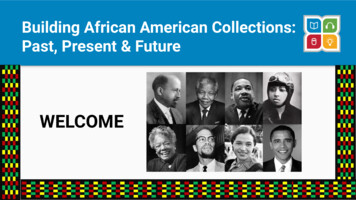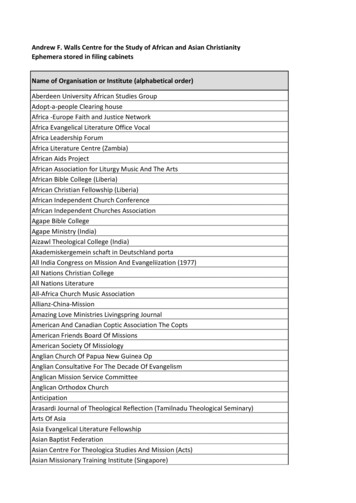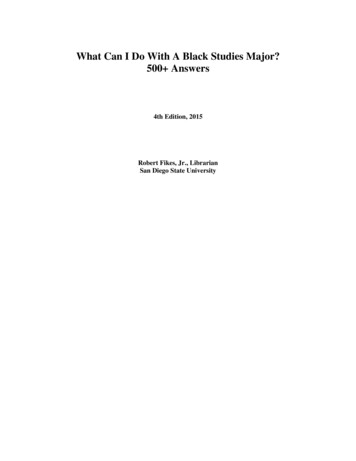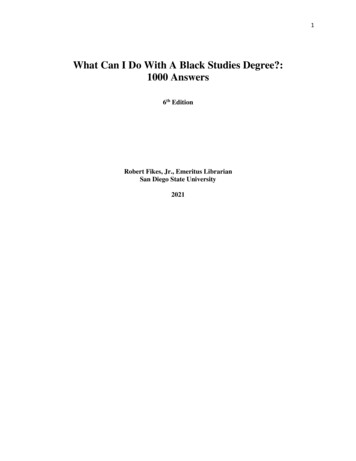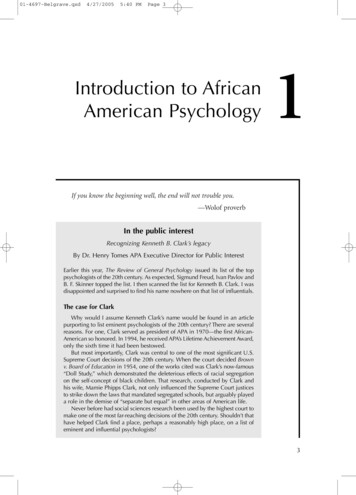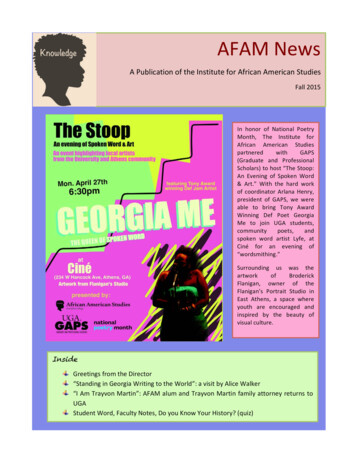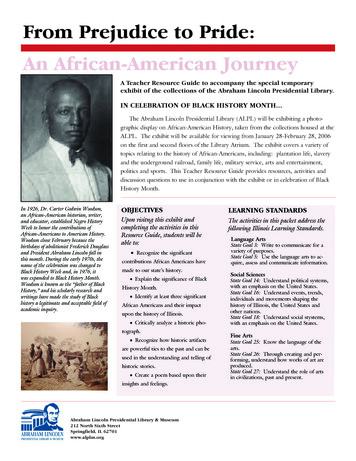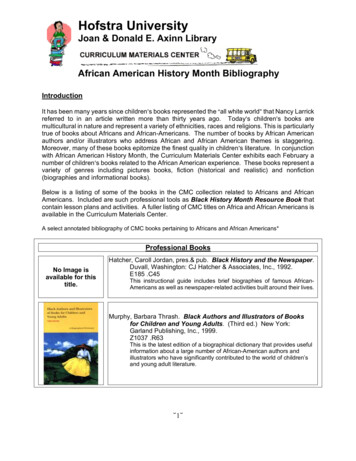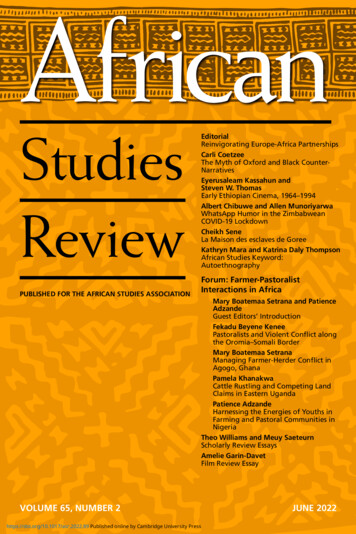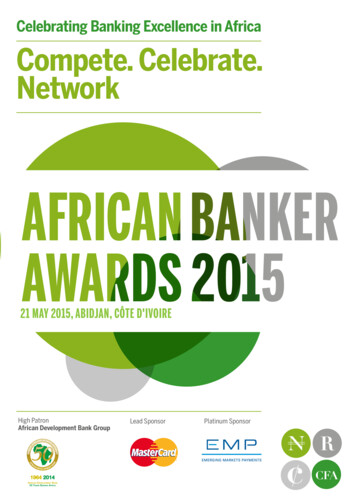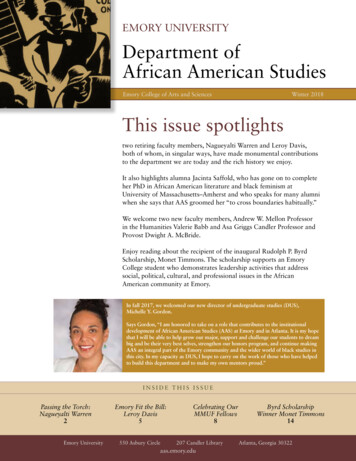
Transcription
EMORY UNIVERSITYDepartment ofAfrican American StudiesEmory College of Arts and SciencesWinter 2018This issue spotlightstwo retiring faculty members, Nagueyalti Warren and Leroy Davis,both of whom, in singular ways, have made monumental contributionsto the department we are today and the rich history we enjoy.It also highlights alumna Jacinta Saffold, who has gone on to completeher PhD in African American literature and black feminism atUniversity of Massachusetts–Amherst and who speaks for many alumniwhen she says that AAS groomed her “to cross boundaries habitually.”We welcome two new faculty members, Andrew W. Mellon Professorin the Humanities Valerie Babb and Asa Griggs Candler Professor andProvost Dwight A. McBride.Enjoy reading about the recipient of the inaugural Rudolph P. ByrdScholarship, Monet Timmons. The scholarship supports an EmoryCollege student who demonstrates leadership activities that addresssocial, political, cultural, and professional issues in the AfricanAmerican community at Emory.In fall 2017, we welcomed our new director of undergraduate studies (DUS),Michelle Y. Gordon.Says Gordon, “I am honored to take on a role that contributes to the institutionaldevelopment of African American Studies (AAS) at Emory and in Atlanta. It is my hopethat I will be able to help grow our major, support and challenge our students to dreambig and be their very best selves, strengthen our honors program, and continue makingAAS an integral part of the Emory community and the wider world of black studies inthis city. In my capacity as DUS, I hope to carry on the work of those who have helpedto build this department and to make my own mentors proud.”INSIDE THIS ISSUEPassing the Torch:Nagueyalti Warren2Emory UniversityEmory Fit the Bill:Leroy Davis5Celebrating OurMMUF Fellows8 1550AFRICANAsbury AMERICANCircle STUDIES207NEWSLETTERCandler Libraryaas.emory.eduByrd ScholarshipWinner Monet Timmons14Atlanta, Georgia 30322
Passing the torch:Reflections on a remarkable careerAfter 30 years of being part of the Emory community, Nagueyalti Warren,professor of pedagogy, recalls what led her to Emory, her most memorablemoments, and her plans after retirement. Best of all, she shares words ofwisdom for future generations.Warren began her career as assistant dean in what is known now as theOffice of Undergraduate Education. As such, she enjoyed the relationshipsthat she fostered with students and coworkers alike. She fondly recalls hearing the late Peter Dowell’s laugh float through the hallways of the buildings,indicating that his presence always kept the job interesting and fun. Shealso developed a friendship and professional partnership with Sally WolffKing, who was also assistant dean at the time. Their collaboration led to thecoedited volume Southern Mothers: Fact and Fictions in Southern Women’sWriting. Assisting Emory students, though, is what brought Warren the mostsatisfaction.Nagueyalti Warren,Professor of Pedagogy,African American StudiesWarren and Vera Rorie—former assistant dean and director of the Office of Multicultural Programs andServices—developed the Minority Mentoring program to assist minority students on academic probation.The program paired the student with a faculty member who would assist with time management, goal setting, tutoring, and the like. Students initially resisted the program, feeling as though they were being calledout for their academic performance; however, Warren was not deterred and continued to build the program. By 1996, the program had proven so useful that all students wanted to participate, and the collegeopted to incorporate the faculty mentoring program into its portfolio.The road to African American StudiesFollowing completion of her undergraduate degree, Warren applied to the graduate program in English atBoston University. To her dismay, she did not gain acceptance and decided to write a letter to the department to express her displeasure. In the meantime, she was admitted to the graduate program in Englishat Simmons College. Shortly after being admitted at Simmons, Warren received a phone call from SamuelWashington Allen of Boston University’s English department.Allen was not calling to discuss her application to the English department but instead wanted to tell herabout a new program called Afro-American Studies. The program was only accepting seven students, andAllen believed it would be beneficial for Warren to apply. She did and was accepted to the master’s program in Afro-American Studies. It later occurred to Warren that she was now enrolled at two differentschools at the same time. She never notified either school of her dual enrollment, and while she claims it“nearly killed” her, she was able to complete them both successfully. Being in both programs also allowedher to stay focused on her career track of African American literature.continuedAFRICAN AMERICAN STUDIES NEWSLETTER 2
Passing the Torch continuedOn a rollMeeting the daughter of Desmond Tutu, Theresa Thandeka Tutu, is one of Warren’s greatest moments atEmory. That meeting sparked a lasting friendship between the two women, so much so that Warren stayedat the home of Desmond Tutu when she visited South Africa.There were many funny moments during the years, but the one that stands out happened on graduationday–spring 1989. During that time, it was traditional for members of Warren’s office to spend Mother’sDay weekend rolling the diplomas for graduation. The ceremony was held at Woodruff PE Center, andall of the diplomas were placed on a table on the stage. As students’ names were called, Warren and WolffKing would hand out the diplomas. Some of the students were nude under their gowns and some were intoxicated. One student came up and bumped the table, which caused all the diplomas to roll off. Needlessto say, from that moment forward, students did not receive their correct diploma, which of course addedto the chaos. Thankfully, that never happened again.Making her peace with EmorySuspend judgment: that is one of the valuable lessons Warren learned while being here. When she cameto Emory, she did not believe that she would stay long, believing the environment was not friendly. Peopledid not greet one another, and she started to believe that Emory was, in her words, a “hostile environment.” While not everyone was friendly, she did eventually meet people who were welcoming and supportive, which made her realize the importance of suspending judgment.continuedWords of Wisdom Be sure to vote! Become as educated as possible. Don’t allow anti-intellectuals to denigrate what you know to be valuable—like your education. Recognize that all you receive is not just for your personal enhancement or enrichment but places onyou the obligation to give back. The National Association of Colored Women’s motto was “Lifting asWe Climb,” and it should be heeded today, for it encourages a sense of noblesse oblige. The more opportunities one receives, the more obligations one has to help others. Instead of a sense of entitlement,develop a sense of social responsibility. People tend to get confused and focus on “I.” If we lose thefocus of unity—that we are all in this together—it becomes chaotic like it is now.AFRICAN AMERICAN STUDIES NEWSLETTER 3
Passing the Torch continuedLove and missesWarren is grateful that she is part of a profession that allows her to do what sheloves: read and then share and discuss what she has read with others. She believesthat what a student reads and studies will influence how he or she sees the world.To watch students come in as young as 17 years old and blossom into young professionals has been rewarding.She will miss being in the classroom and interacting with students. Similarly, she willmiss listening to their ideas and opinions and noting how they have differed duringthe past three decades.And now . . .Buoyed by BooksWarren’s favorites?The Color Purple,by Alice WalkerHalf of a Yellow Sun,by Chimamanda NgoziAdichieThe Poisonwood Bible,by Barbara KingsolverName a book that youbelieve every major/minorshould read:All AAS majors and minorsshould read The Souls ofBlack Folk, by W.E.B. DuBois. According to Warren,“the book provides a critiqueof the African American experience in 1903 that is stillrelevant today.”Warren will finish her Alice Walker book, write, and travel. Withregard to the latter, it is quite an itinerary: she will go to Mexicoto see the ruins, take in the Pacific side of South America, and visitNova Scotia, for she is interested in the history of black peopleescaping slavery to go there. She also plans to visit the Philippines,Alaska, and Antarctica. Her travels to Emory will remain frequent,in that she plans on extensively utilizing the Stuart A Rose Library.American Pieby Nagueyalti WarrenI’m seven in the porch swinglooking up at a periwinkle skytiny cotton-wool cloudsfloating so like a turtleI can see how the world turnsIt’s not fast, but slower than the butterfly’swing fanning our honeysuckle bush.I’m in shorts, halter-top, blue tennis,daydreaming I’m a movie star,when four boys on Schwinn Stingray bikespedal past our wide front porch.I smile and wave, they yell,“nigger bitch!”fast riding down the street.AFRICAN AMERICAN STUDIES NEWSLETTER 4
For an ambitious scholar, Emory fitthe billLeroy Davis, associate professor of African American Studies and History,will retire at the end of the academic year after being on sabbatical thiscurrent year. Davis was an integral part of the creation of the departmentand will be sorely missed by students and colleagues.Didn’t fit the moldIn reflecting on his time in academia, Davis recalls that he was very mucha nontraditional student and faculty member, beginning his postsecondaryeducation via the GI Bill after serving in the military. Davis then taught atKennesaw State University and the Atlanta University Center for severalyears before coming to Emory.Leroy Davis,Associate Professor,African American Studiesand HistoryDavis’s mentor during his PhD program in the Pan-African Studiesdepartment at Kent State University enhanced his understanding of African American Studies asa discipline. That exposure combined with his experiences working at historically black colleges.Morehouse and Spelman had a positive impact on his thinking about African American Studies beforeEmory. Davis joined the Emory faculty in 1991 after feeling that being at a research institution wouldhelp him achieve his professional goals. In all of his positions at various universities, he says, “Whatremained pretty constant for me was my interest in working with black students.”Generational adjustmentsDavis had to make some adjustments when he came to Emory. “Certainly at Kennesaw, this was a timewhen there were still a large number of older students like myself, including Vietnam veterans and othersfrom the same generation who decided to continue their education after years of full-time work. In addition to 18- to 24-year-olds, the older Kennesaw students were a significant part of my student model. Ican remember in those early days that I would say to the students at Emory, ‘Oh well, you remember thishappened in the late 60s or the early 70s,’ and I would get these stares because they were like, ‘What’s hetalking about?’ I could say that at Kennesaw and even to some extent in the early 80s at Morehouse. Iquickly learned that familiarity with that time period did not work at Emory for students born in the late60s and early 70s. So, there were adjustments that I really had to make when I came to Emory.”Rudolph Byrd came to Emory in the same year as Davis—1991. Byrd was the Goodrich C. WhiteProfessor of American Studies and served as the director of the Department of African American Studiesfor many years. When Byrd and Davis joined the faculty, African American Studies was a program, not yeta department.continuedAFRICAN AMERICAN STUDIES NEWSLETTER 5
Ambitious Scholar continuedA shared vision for AASDavis notes that Byrd was very much involved in a number of different ways in the Emory community,and community involvement was a major part of the African American Studies program. Of Byrd, Davis says, “We had the same vision in terms of what an African American Studies department was.” Davisrecalls that this was a time when the National Black Arts Festival in Atlanta was “really a big thing,”and the department was a major component of it.Davis notes that the community involvement of the department “fit very well into my expectations ofwhat an AAS department was all about. That’s what I remember in those very early years, the interactionthat often took place between the metro Atlanta community and AAS at Emory. And, certainly, DeloresAldridge had laid the foundation for that. There were several people that she had hired part-time evenbefore I got there who taught classes at the Atlanta University Center.” Aldridge is the Grace TownsHamilton Professor of Sociology and African American Studies Emeritus. She became the foundingdirector of the program in 1971 and administered it until 1990.While Davis held a joint appointment with the history department and AAS (“and the history departmenttreated me very, very well,” he notes), he says, “certainly, I felt my major interest was in the goals of anAAS department with its emphasis on academic excellence and social responsibility.” As time went on,Davis says, “We [AAS] were kind of victims of our own success.”Evolving to fit a changing student populationBlack students always had the freedom to major in any field of their choosing; however, there were stilllimited job opportunities for them. Davis says, “I saw this bubble, in many ways, burst over time as aresult of expanded job opportunities.” Consequently, AAS course enrollments plummeted as major fieldsdemanded more concentration, and Emory began to expand its student populations. “It’s difficult,” says“That’s what I remember in those very early years.The interaction that often took place between the metroAtlanta community and AAS at Emory. And, certainly,Delores Aldridge had laid the foundation for that.”Davis, “to look at expanded job opportunities in a negative way, but we had to make adjustments to thenew kind of populations that were coming onto Emory’s campus, and that was not always an easy thingto do. There had to be adjustments in how we taught our classes; some of our students were not as interested, I think, in some of the community components as they had been before.”Davis continues, “This is a different generation, and one of the things I really like about the students istheir emphasis, regardless of major, on activities that have to do with social responsibility,” Davis says.continuedAFRICAN AMERICAN STUDIES NEWSLETTER 6
Ambitious Scholar continued“Talking about millennials, regardless of all the things that people tend to say that may be negative aboutthat generation, I think one of the things they do have, no matter what their interests are professionally, isa sense of social responsibility. I think that’s very important to them.”Davis acknowledged that other kinds of life experiences come to the forefront, and social responsibilitycan become less important as students graduate and move through adulthood. According to Davis, “Youalways want to keep this little part of you that has this sense of social responsibility. Doesn’t mean youspend all your life doing it or anything like that as a career, but there’s a way of thinking about givingback that you never forget about, you see.”Time well spentTwo experiences at Emory, both having to do with community functions, have been foundational for him.One opportunity was working with the Red Cross during the Hurricane Katrina catastrophe. “One of mybest friends lost everything in New Orleans—we taught together at Spelman—and I just felt that it wassomething I needed to do, to be as much a part of trying to help the situation any way I could,” he says.“I taught my classes, kept up with all of that, but almost every day I went to the local Red Cross andregistered a lot of people coming in, helped them get settled here in the Atlanta area. I enjoyed it so much,I would do it on Saturdays and Sundays. It’s just one of those things that a life in academia, and certainlyat Emory, allowed me to do. I’ll never forget that and I’ll always be very grateful for that.”“Another thing we did, and Emory was very supportive of it, is there were some major photographs thatcame up on lynching. These were photographs that were shared throughout the South, really throughoutthe country, of people being lynched. Thee Smith [associate professor of religion and associated faculty inAAS] and Randall Burkett [curator of African American Collections, Rose Library] were a part of this.”Davis and others took part in a major conference at the Auburn Avenue Research Library in 2000, allowing the community to air their views about Emory getting the photographs. Davis remembers it as a hostile environment, one in which people couldn’t understand the university’s interest in the materials. NotesDavis, “Thee and myself and several others had to explain to them why they were important to have sothat we could always remember.” Davis recalls that Emory supported their position fully. For more aboutthe lynching photographs referenced here, see http://cnn.it/2Bu8FTQ.Davis recalls that his participation in the hurricane reliefefforts and the community conversations about thephotographs “are just two of the things that really standout to me in terms of the way that Emory was fully supportive of that community component in terms of whatEmory is all about.”Jean Bergmark and her husband with Leroy Davis.Bergmark was the author of Grace Towns Hamilton and the Politics of Southern Change.AFRICAN AMERICAN STUDIES NEWSLETTER 7
Celebrating our MMUF fellowsKristin McFadden and Sariyah Benoit are both Mellon Mays Undergraduate Fellows (MMUF) who willgraduate in May 2018 as AAS majors.What makes McFadden tickMcFadden is also an anthropology major, and her research is focused on Gullah communities in SouthCarolina. She spent summer 2017 conducting research and interning at the Penn Center in St. HelenaIsland, South Carolina, where she gained valuable knowledge about curating historical and artistic exhibits. In MMUF, McFadden is privileged to have two faculty mentors. Vanessa Siddle Walker (SamuelCandler Dobbs Professor of African American Studies) is able to work with her on her literature review,while Alicia DeNicola (associate professor of anthropology at Oxford College) assists her with anthropological theory.McFadden came to Emory’s Atlanta campus from the Oxford campus, where she was an OxfordResearch Scholar ch.html). While at Oxford, shewas a member of the Voices of Praise Gospel Choir and Interfaith Council as well as a Peer AssistanceLeader. Additionally, she participated in theory-practice service learning with the PATH Project, whereshe worked with children in an after-school program. On the Atlanta campus, McFadden is a membercontinuedAn Oxford continuee and nowsenior, McFadden is an AAS/anthropology major whose research focuseson Gullah communities in SouthCarolina.Kristen McFaddenBenoit anticipates applying to PhDprograms after taking a gap year.During that time, she hopes to dosomething that connects history andart, or perhaps teach.Sariyah BenoitAFRICAN AMERICAN STUDIES NEWSLETTER 8
MMUF fellows continuedof the NAACP chapter and the Black Student Alliance.She also works as a tutor in the Writing Center andrecently had the opportunity to assist a student in oneof Michelle Y. Gordon’s AAS classes.“I thought I was pre-med when I came to college—Iwas interested in black women’s health and breastcancer and things like that. So I thought I was an anthro and human bio major, but it just didn’t really fit,”McFadden says. During her sophomore year, she realized that she really wanted to research, but she didn’tKristin McFadden at the MMUF Annual Researchfeel that her research mixed very well with the practiceConference in April 2017piece she would be required to do as a doctor. She wasmore interested in “broader questions of access.” “Iwas working with [Alicia] DeNicola as an Oxford College Research Scholar,” she recalls. “She was like,‘Have you thought about this program [MMUF]?’ At that point, I was undecided about what I wantedto do, but then I got more serious about just doing research.”McFadden’s interest in African American Studies began at the UNCF/Mellon summer institute. (Seehttp://bit.ly2kgtr1E.) “I remember being in the space, and everybody’s project was personal to them,and I didn’t feel like mine was personal to me. When I got Mellon, I felt like I had to prove I was doinggood research, and at that time I didn’t understand how anthropologists could do good research thatwasn’t outward. So at the summer institute, I said, ‘This [African American studies] is something thatI want to do.’ ”In Dianne Stewart’s Black Love class, “I became veryintrigued with how interdisciplinary African AmericanStudies is and how relevant and pertinent it is to myinterests and academic and professional goals.”In the semester after the summer institute, McFadden took Dianne Stewart’s Black Love class, which shesays inspired her to major in AAS. “I became very intrigued with how interdisciplinary African American Studies is and how relevant and pertinent it was to my interests and academic and professionalgoals,” she recalls. “I just loved that class,” McFadden goes on, “and I’d go to my other classes and bebored. It was more so that I wanted a blending of the two: I wanted be in an anthropology class thattalked about African Americans and vice versa, and it just wasn’t happening. So I just decided I wasgoing to be an AAS minor and then changed from a minor to a major. So AAS is a nice blend of thingsI was already thinking about.”continuedAFRICAN AMERICAN STUDIES NEWSLETTER 9
MMUF fellows continuedWhat makes Benoit tickSariyah Benoit credits Carol Anderson with “making her” apply to MMUF. “I came into college thinking I was a math and sociology [major], and then I was like, ‘Maybe I can do B-School and make somemoney.’ But then I took financial accounting and got a C and Anderson said, ‘What are you doing?’ Shejust really encouraged me to apply for MMUF. She thought I was getting distracted trying to do otherthings.” Benoit had taken a freshman seminar with Anderson on black athletes in America, as well asAnderson’s Civil Rights Movement course.She was drawn to major in African American Studies during her first semester at Emory. “I took theintro class with [Pellom] McDaniels—his enthusiasm and the content in the course captured what Iwanted from sociology and realized I wouldn’t get from sociology. So that attracted me, definitely.”In her classes, Benoit says, “there was a lot of outward,very clear, pushing back and challenging . . . And that’s alot of what we get from Mellon.”Benoit has worked as an intern for the Emory Black Student Union (EBSU) since her sophomore year.She began doing outreach and external affairs and gained experience helping other organizations communicate with each other. During her junior year, she was the historian and Caucus of Emory BlackAlumni liaison, during which time she attended their meetings and took minutes. She also worked inthe Stuart A. Rose Manuscript, Archives, and Rare Books Library doing archival work. She is currentlythe senior staff administrator for the EBSU.Benoit and McFadden recall that certain classes and faculty members helped prepare them for MMUF.As an Oxford student, McFadden took Patricia Del Ray’s Gender, Race, Class, and Sexuality course.McFadden notes that the way Del Ray “was speaking about African American anthropology and sociology and history” allowed her to begin thinking about the merits of interdisciplinary fields like AfricanAmerican Studies. She also credits Molly McGehee for helping her frame her MMUF application. McFadden took McGehee’s African American Literature Since 1900 course at Oxford.Benoit says her AAS classes prepared her to apply for MMUF, but Leroy Davis truly prepared her forlife as a fellow. Benoit took Davis’s Black Power in Africa and the African Diaspora class during hersophomore year. He had very high expectations for her and provided her with a lot of constructive criticism. In each class, there was “a lot of outward, very clear, pushing back and challenging in the classroom. And that’s a lot of what we get from Mellon—a lot of challenging and trying to constantly betteryourself.” Benoit’s AAS classes helped her improve her writing, and she says that Davis’s class helpedimprove her critical thinking skills when she was constructing an argument in the classroom. Daviswould consistently talk about the evidence students were providing and push them to be better scholars. In addition to his other roles at Emory, Davis has served as a director of the UNCF/Mellon summercontinuedAFRICAN AMERICAN STUDIES NEWSLETTER 10
MMUF fellows continuedinstitute at Emory for many years. McFadden corroborates Benoit’s recollections, saying, “I rememberin the summer institute, [Davis] was always saying, ‘Explain yourself. Why are you saying this?’ ”Benoit has been awarded Emory’s Fox Center for Humanistic Inquiry’s Humanities Honors Fellowship.In conjunction with the Emory College Honors Program, the fellowship guarantees support for the nextsemester in completing a project.McFadden plans to take a “gap year” before applying to PhD programs in anthropology or AfricanAmerican studies. She is looking for jobs in the nonprofit sector, particularly in social and political activism or development. She feels the field is one that would combine her research skills and interests.Benoit is also applying for jobs this semester for after graduation. She hopes to do something that connects history and art or perhaps teach for a year before she goes on to pursue her PhD. She feels thatMMUF and AAS have been good practice for teaching, as teachers have to “explain themselves.”Instead of returning to her home state of New York, she likely will remain in Atlanta for the year.New Summer 2018 Course Taught byKimberly Wallace-SandersSouthern Traditions: Flags and MonumentsSweet tea, fried chicken, BBQ, Sunday church, magnolia trees,pickup trucks, Confederate flags and monuments. This courseexplores the meaning and implication of “Southern traditions”and how they are connected to race. Using literature and film,we will consider the contemporary debate about flags andmonuments; is Southern culture and tradition under attack?What assumptions are made about Southern tradition withregard to race?AFRICAN AMERICAN STUDIES NEWSLETTER 11
Welcome to our newest core facultymemberValerie Babb is the Andrew W. Mellon Professor of African AmericanStudies and English at Emory University. She received her PhD and MAfrom the University at Buffalo, State University of New York, her BAat Queens College, City University of New York. She has been a professorat University of Georgia and Georgetown University.Her research interests include African American literature and culture,as well as the way race impacts the United States and global society. Babbexplores culture through the mediums of film, art, and music. She focuseson how academic study can be translated to bettering communities.There is so much African American history in Atlanta, which is whyshe looks forward to visiting the King Library, Auburn Avenue, and theAtlanta University Center. She also wants to build relationships withinEmory and the surrounding local communities.Valerie Babb,Andrew W. MellonProfessor of AfricanAmerican Studiesand EnglishIn the spring, she will be teaching AAS 385: African American Literature and Culture. She’s excitedto teach this course to a broad range of students and facilitate discussion of African American novelsand elements of American popular culture. Babb believes that black culture is so expansive that manypeople from diverse backgrounds engage with it even if they are not aware of doing so.Getting to know youWho is your favorite author?Ralph EllisonClaudia RankineHerman MelvilleI chose those three because there is a certain timeliness of vision and smart, witty humor in Ellisonthat very few authors have been able to accomplish. Rankine, author of Citizen: An American Lyric,sees America so clearly and expresses it so beautifully. As for Melville, he remind us that no matterwhen they worked, good writers always have forward-looking visions that continue to teach us.What is your favorite book and/or novel?I can’t name a favorite, but right now I am reading Homegoing by Yaa Gyasi and Manhattan Beachby Jennifer Egan, just for fun.What would you like the Emory community to know about you?I think of myself as an activist academic. I am not here just to read, write, and study but to makeeverything that I am teaching and researching a benefit to the larger community.AFRICAN AMERICAN STUDIES NEWSLETTER 12
New provost and one of our ownDwight A. McBride, Provost and Executive Vice President of Academic Affairs and Professor of African American StudiesDwight A. McBride serves as provost and executive vice president of academic affairs and professor ofAfrican American Studies.McBride came to Emory in July 2017 from Northwestern University, where he served as dean of thegraduate school and associate provost for graduate education, as well as the Daniel Hale WilliamsProfessor of African American Studies, English, and Performance Studies.During his time as dean and associate provost, the graduate school made unprecedented progress indiversifying Northwestern’s PhD programs, oversaw a major increase to the base stipend rate and otherforms of financial and academic support for PhD and MFA students, expanded professional developmentof
Kennesaw State University and the Atlanta University Center for several years before coming to Emory. Davis's mentor during his PhD program in the Pan-African Studies department at Kent State University enhanced his understanding of African American Studies as a discipline.
